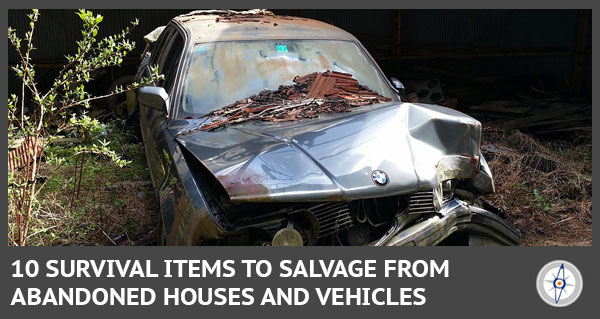
While I would like to think that all preppers and survivalists will have the supplies that they need when SHTF, this is simply not realistic. Even if you have months of supplies set back for you and your family, there are variables for which you cannot plan. The SHTF scenario may last longer than expected. You may be robbed of your supplies or decide to take in another family in need. Perhaps you are forced out of your home and can only bring a portion of your supplies. All of these are reasons that you must be prepared to salvage for your supplies when needed.
Salvaging Supplies
Obviously, taking supplies that are not yours is far from ideal. However, in many cases you have tough choices to make. If you are short on supplies you can let your family suffer, rob people at gunpoint, or peacefully salvage abandoned cars and homes for the supplies you need. My suggestion is to create a grid around your location and systematically look for your supplies. Start with the closest sectors, and gradually work your way out further and further. Eventually, you may want to consider moving to a new location to start a brand new grid. However, you must always use extreme caution when salvaging for supplies. Have a way to defend yourself, stay out of sight, and be sure that a car or home is truly abandoned before you enter.
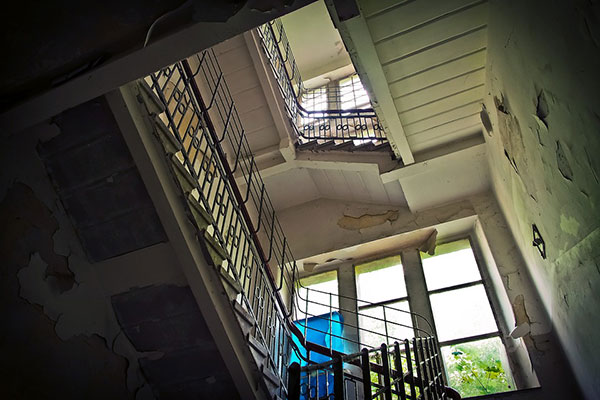
Efficiency is also vital when salvaging in abandoned cars and houses. Work in groups of at least two and move silently. Have one person clear houses to ensure they are empty while another stands lookout. Then move from room to room looking for supplies. In addition, look for specific items in specific places. Go for food and water in the kitchen and pantry. Look for tools and flammable items in the garage. Look for clothing and blankets in the bedrooms. Salvage as much as your group can carry and decide to either move on to the next location or to drop your load and come back for more. In this article, we will cover the top 10 items to target when salvaging in abandoned cars and houses.
Food
Because most food has a limited shelf life, food should be one of your top priorities. Even if you have plenty of dried and canned goods, you will want some variety in your diet. Your primary focus should be to find items that will last a long time. Flour, pasta, jerky, oats, beans, rice, and sugar can be used in multiple ways.
Canned goods are heavier but still last. Then you can check for any fresh foods such as fruits, vegetables, meats, or dairy products. You might be lucky enough to find a home that was recently abandoned. You might also find a house that is cold enough that the frozen foods stayed frozen. Cars will often stay cold enough to preserve food in the winter time.
Water/Purification Supplies
Clean drinking water is always hard to find in survival scenarios. If the water supply is tainted or shut down, people will be desperate for bottled water. You also might be bugging out and have to find water on the go. Believe it or not, water purification supplies are more important than water itself.
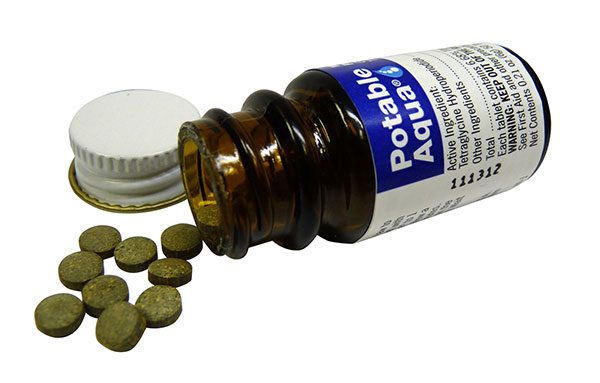
If you find a bottle of bleach or iodine, you can potentially purify tainted water for months. You might get lucky and find a water filter attached to the refrigerator or faucet as well. Once you have checked for these items, look for water itself. Bottled water is often kept in pantries, garages, and basements. As a last resort, look for runoff water collection or a water heater that might be full.
Firestarters/Flammable Materials
Fire is very important in a survival scenario, and it does not always come easy. Both abandoned cars and homes could have matches or lighters, especially if the owner was a smoker. Most homes will have some kind of lighter or matches along with candles. You also want to look for other flammable materials such as gasoline, lighter fluid, charcoal, and newspaper. The garage in particular is a good place to search for these items.
Clothing/Blankets
When you are struggling to survive, fabric of any kind will not last long. Hypothermia is the number one killer in survival scenarios. To combat this threat, you need multiple loose layers of clothing including blankets. Clothing also protects your body from the sun, insects, and general abrasions.
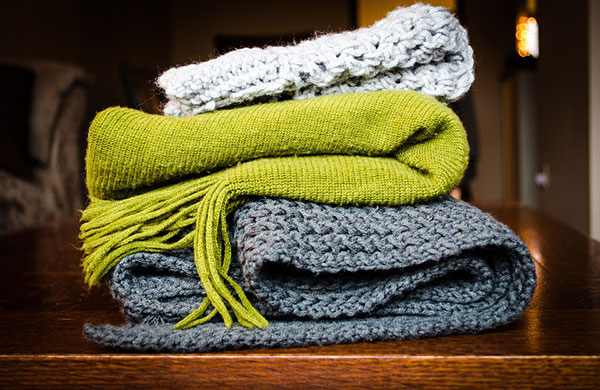
Having clothing that fits right is a valuable commodity, and clean clothing with no rips or tears is even more rare. Abandoned clothing is common to find in both abandoned cars and buildings. Take the time to look for these items to keep your body warm and protected.
Tools
You want to be careful about how many tools you carry as they are often heavy and bulky. However, any time you can pick up a tool that you do not have it can make your life much easier. This could mean hand tools like hammers and screwdrivers.
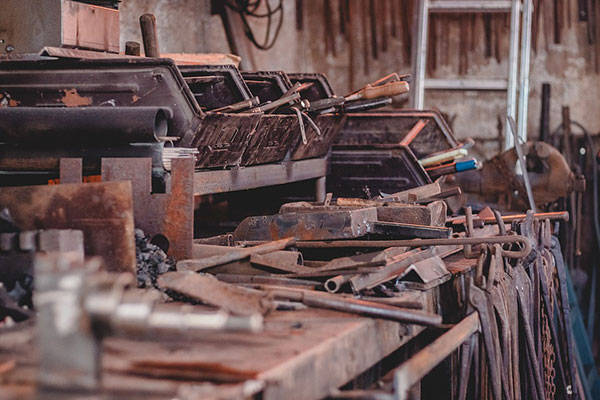
It could also mean tools like flashlights, crank radios, duct tape, or multi-tools. Check places like the trunks of cars, garages, and under sinks for these tools. You might even want to pick up extras to trade with other people.
Cordage
Cordage can be made from natural materials found in the wild, but it is not very strong and incredibly time consuming to make. If you can find cordage in a home or car, you are best to take it with you. This could be rope or twine that you find in the garage. It could be zip ties or bungee cords. It might even be yarn or thread in a sewing room. Wiring works well as cordage, so you can always snag that from a car or home. Salvage as much as you can carry. You will always find a use for cordage.
Medical Supplies/Toiletries
The best time to find medical supplies are when you do not need them. Often by the time you need them, it is too late. You can check bathrooms and the trunks of vehicles for first aid kits. Often these have several valuable items in one place. Items like bandages, rubbing alcohol, peroxide, and burn ointment are especially valuable. Always check the medicine cabinet and the glove box in vehicles for over-the-counter or prescription medications.

Aspirin and Benadryl are two of the most valuable over-the-counter options. Always take prescriptions with you even if they are intended for an illness you likely will never get. You never know when you might run across another person that needs the medication that you have. In addition, toiletries are incredibly valuable in a SHTF scenario. Bathing is vital to health, so items like soap, shampoo, and toothpaste are worth a great deal. It is also nice to have some toilet paper as most people will run out quickly.
Batteries
When the only people with electricity are those that have generators, batteries are very important. If you can find a battery tester or charger, this can make your hunt much more efficient. In a vehicle, auto batteries are great if they will hold a charge. You can even link several together to power larger items.
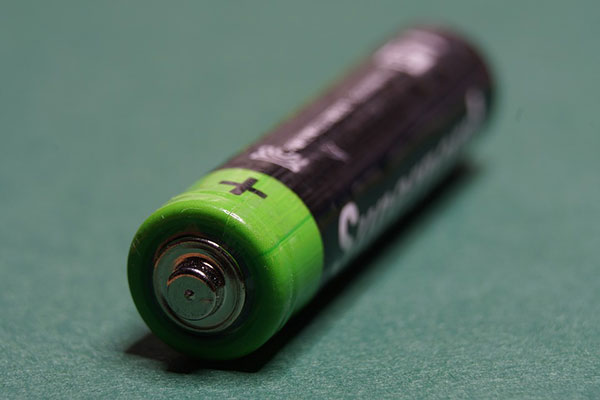
For the smaller batteries, take as many as you can in a variety of sizes. If you have a charger, rechargeable batteries are especially valuable. Do not forget about battery packs and even phone batteries if you find them.
Items for Bartering
As a general rule, the best items for bartering are those that do not serve a practical purpose for yourself. This includes items like alcohol, cigarettes, coffee, chocolate bars, and soda that could make you dehydrated or negatively affect your health. Books are often good bartering items as you may read the same book dozens of times and be ready for a change. Also, if you find a rare tool that you already own you can always pick up a second for bartering. Just look for items that you do not need, but that other people may want.
Weapons
In a SHTF scenario, weapons are always a good thing. You hope that you do not have to use them, but they are still vital. You never know when somebody has more guns than they can carry in their safe, or maybe they left a handgun in the glove box. Do not forget to pick up any ammo that you find. Even if it does not fit your gun, you can always trade with somebody else. Grab any bows or crossbows that you find, and always look for an opportunity to pick up a better knife or machete.
Final Thoughts
Even if you are not quite as prepared as you would like to be when SHTF, you can still get by if you salvage for supplies in abandoned cars and houses. However, I cannot emphasize enough that you need to do this safely. If you go running into someone’s home and they are still there, they will likely defend it to the death. Work in groups, be strategic, be sure homes are cars are empty, and protect yourself and you will come out ahead.
